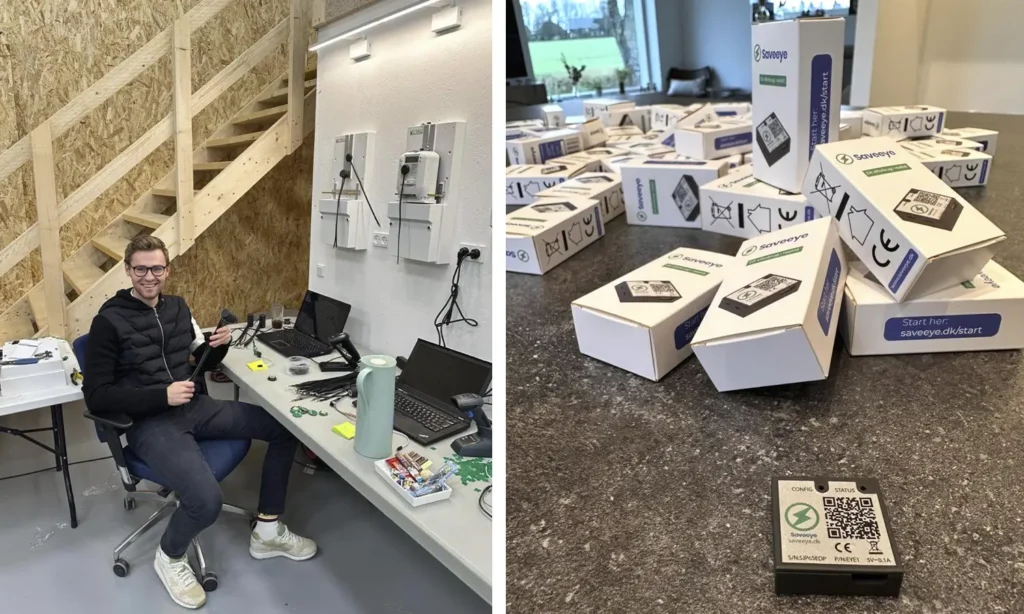It doesn’t take long before Michael Grønager gets the first lead. Seconds actually. With an address for a crypto wallet and a few entries, he is on the right track. He can see that I have purchased my digital coins from what used to be, back in 2014, Bitcoin Nordic.
Bitcoin Nordic had bought them on the Bitstamp Exchange, and they are later transferred to a wallet at the crypto exchange Coinbase. And only a few links further out, the tracks take him on a path deeper into the dark web.
”It typically starts with finding a bitcoin-wallet or something similar. I don’t know who the person in the picture is, but I know how to find out,“ Michael Grønager explains, the Danish co-founder and CEOCEO betyder Chief Executive Officer og er den øverste leder i en virksomhed, ansvarlig for den overordnede strategi og ledelse. CEO’en rapporterer normalt ti... More of the blockchain-startup Chainalysis.
Chainanalysis is the world’s leading startup that aims to track the people behind bitcoin transactions, often referred to as “anonymous digital valuta”. In fact, Chainanalysis is so good at what they do that they help the FBI to track-down drug supply chains in the underbelly of the internet.
But now, the startup is ready to launch into a new business area: helping banks handle cryptocurrency so they can safeguard themselves against money laundering.
The big phonebook for blockchain
For a long time bitcoin was perceived as an anonymous digital currency, whose only feature was that it could be used to trade shady products on the dark internet. But it is not as anonymous as many initially thought.
“Bitcoin can secure a cross-border transaction, and everyone has access to it – but it is not anonymous. It is traceable and transparent. As soon as you start transferring them, data points start to appear. If you are super good you might get away with it anonymously, but it’s difficult to do it 10 times without making mistakes,” Michael Grønager explains.
All accounts and transactions on the blockchain network are publicly available – and have been since the beginning. Anonymity derives from the lack of identities attached to the public information. Chainalysis changes that.
Through a mix of test transactions, data partnerships and algorithms guessing who is behind different addresses, the startup has created a large registry – a sort of phonebook over the blockchain. In this way, they can find out if a given wallet address has transferred money to a stock exchange or Al Qaeda.
Bitcoin crime moves from drug to theft
Chainalysis has thus proved that the anonymity of Bitcoin is much smaller than people think – or read in the media. The cryptocurrency is used for more things than trade on the deep, dark, web than it was just a few years ago.
In 2012 the transactions to darknet markets accounted for more than 30 percent of the traffic on the blockchain. Today it is below 1 percent – although a recent analysis made by Chainanalys shows the value of transactions to darknet markets has been increasing.

According to the analysis, the increase in darknet transactions is because large black markets have been closed. New and more anonymous currencies such as Monero and Zcash have come to an end, while Bitcoin has grown its way into a financial asset. Therefore, criminals have found new ways to exploit Bitcoin.
“Crime has shifted from drugs and weapons to ransomware, hacking and the theft of Bitcoins and other cryptocurrencies. It is a very different form of crime. Some users are liberal and believe that drugs and weapons must be freely available, but even hardcore cypherpunks are not fans of theft,” says Michael Grønager, who believes that Bitcoins is a better weapon against anonymity than cash.
“I would recommend cash if you want to be anonymous. There are numbers on all banknotes, but no one writes them down. So you can not follow a cash track. That’s what Bitcoins does, so everyone knows where they’ve been, ” Michael Grønager explains.
It is the continuous record of users that is generated when Bitcoins change hands that makes Chainalysis able to secure banks against people trying to launder money via Bitcoins.
Danish Banks: “Don’t want to touch bitcoin with a barge pole.”
There are still no Nordic banks that are directly involved with the crypto currency. They do not offer customers advice, investment in or storage of cryptocurrency.
At the beginning of December, a collection of the largest Danish banks announced at the same time that they would no longer receive gains that have been derived from Bitcoins because they could not be sure whether the digital currency was involved in drug sales or money laundering.
“The Bitcoin system is designed so that people remain anonymous, and that just does not work for a bank,” Lars Sjögreen, head of Transaction Banking in Danske Bank, once said to Børsen.
This January, he added in an email to TechSavvy Media that anonymity “makes it difficult to track who is involved in a transaction. It can be difficult to handle when we, as banks, get to know our customers.” But at the same time, he was open to the bank receiving winnings from Bitcoin trading if customers were able to document where the crypto gains had come from. A practice similar to what Spar Nord and Saxo Privatbank told us they are doing.
And money laundering through cryptocurrencies is a real issue. The director of Europol Rob Wainwright estimates in an interview with BBC that 3-4 percent of illicit proceeds i Europe – approximately €3.3 – 4.5 billion – is already being laundered through cryptocurrencies. And the number is rising.
Banks on their way to a crypto-future
While the majority of the European bank sector has agreed not to let cryptocurrency inside their systems – with anonymity and money laundering as heavy arguments – a handful of smaller banks have run counter to the trend, and both now act and advise on the cryptocurrency. These banks are the Swiss banks Vontobel and Falcon Bank as well as Fidor Bank in Germany, while the neo-bank Revolut has announced that they will soon give their 1.5 million customers access.
“In fact, I think it has been a question about the banks sending a stronger signal against Bitcoins. My feeling is that the banks come along and think it’s exciting – but of course it’s high risk and they cover the risk,” says Michael Grønager.
At Chainalysis they have also seen that there has been a shift in the sector since the start of 2014. Amongst other things, the startup has helped to develop procedures for cryptocurrency for the UK bank Barclays, and Michael Grønager finds that the larger banks are currently discussing whether to offer to keep Bitcoin for their customers.
In the long run, he does not doubt that the spread of blockchain will fundamentally change the financial world, and in that development, Chainalysis will be experts in the intersection of blockchains and compliance.
“Over the next 10 to 15 years, people will start to have a different concept of what money is. Today money is liquid, but there are not many other values that are. With blockchain, you can use all of your value represented on a blockchain as cash- or finance them in other ways. It makes the world look different. Everything can be financial instruments and values can flow between all classes.”

















 Kære læser, du er meget velkommen til at dele vores artikler på sociale medier, linke eller referere til artikler eller content på TechSavvy.media. Men ønsker du helt eller delvist at kopiere indhold fra sitet må det kun ske efter aftale med vores redaktion på editorial@techsavvy.media.
Kære læser, du er meget velkommen til at dele vores artikler på sociale medier, linke eller referere til artikler eller content på TechSavvy.media. Men ønsker du helt eller delvist at kopiere indhold fra sitet må det kun ske efter aftale med vores redaktion på editorial@techsavvy.media.
 Kære læser, du er meget velkommen til at dele vores artikler på sociale medier, linke eller referere til artikler eller content på TechSavvy.media. Men ønsker du helt eller delvist at kopiere indhold fra sitet må det kun ske efter aftale med vores redaktion på editorial@techsavvy.media.
Kære læser, du er meget velkommen til at dele vores artikler på sociale medier, linke eller referere til artikler eller content på TechSavvy.media. Men ønsker du helt eller delvist at kopiere indhold fra sitet må det kun ske efter aftale med vores redaktion på editorial@techsavvy.media.